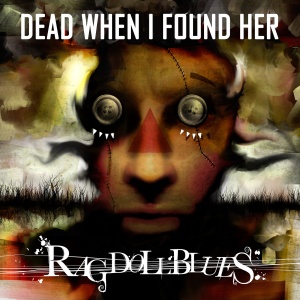Dead When I Found Her - Rag Doll Blues

Reads: 2614 times
82%
CDs catalogue:
Hardly is a style of music as scattered into such an inscrutable number of sub-genres as electronica.
On one hand it is comprehensible why (mostly) music producers and journalists always try to find new labels for the music they are writing about: it can have not just distinguishing, but also commercial or social reasons. In the long run it can make sense: Siouxsie and the Banshees, it may be recalled, were the first to be labelled by the critics as post-punk, gothic rock and even coldwave and thus started a wave that did not come to a halt upon today.
On the other hand it can lead to the point when one can't see the wood for the trees.
Although Dead When I Found Her could, for those categorization addicts of an etymological-pathological character, be labelled as 'future electro-industrial with EBM influences', they for a change make it easier and call their style simply industrial.
I have to admit that until their recent and second release Rag Doll Blues I have never heard about this Portland, Oregon, musical act with an interesting name. They seem to be a promising upstart in the field of industrial/future pop.
'No More Nightmares' is the title of the opening track on the album. A catchy piano-melody introduces the song, is interrupted by electronic effects, which transform into hard drum loops. The vocals as well as the whole musical outfit are reminiscent of future pop acts like And One and VNV Nation. In the end of the song the instrumentation continues the piano-melody from the beginning. Even more into the future pop direction move the tracks 'Better Days' and 'New Age of Reason'. The beats are not so hard as in the first one, though. Machine and synthesizers alternate between each other.
Throughout the whole album the songs are arranged so that slower and faster songs take their turns. 'Doll pieces', 'Mirrors', 'Doll parts', 'Scissors' and 'Stainless' fit into the slower category, the latter maybe the most experimental on the record and evocative of mid-2000's Project Pitchfork sound. With its length of more than eight minutes it is epic.
The faster, more danceable hits are 'Rain Machine', again reminiscent of Project Pitchfork and also some Skinny Puppy, and 'Lesser Light'.
Rag Doll Blues definitely has the potential of becoming a classic in the dark-electro scene. I like the balance between slower and faster songs and the deep-going beats. The tracks are well mixed in a good quality and the two guys seem to know how to turn the buttons. I am also very glad that the duo abstained from using harsh vocals, still, I am not too persuaded by the voice. Remixed to sound like the generic future pop vocal, it's perhaps comparable to when Bob Marley's style of singing became the indispensable archetype of all reggae acts to follow.
Yet another difficulty with the singer's voice is that despite the difference in song characters, it offers not much variety. Considering most listeners access music via the vocals, there is a huge possibility, that the record might get boring after some time, because the individual pieces would start to sound very similar, although they are actually not.
Tracklist:
01. No More Nightmares
02. Better Days
03. New Age Of Reason
04. Rain Machine
05. Doll Pieces
06. Dry Bed
07. Mirrors
08. Panic Matter
09. Doll Parts
10. Lesser Light
11. Scissors
12. Stainless
On one hand it is comprehensible why (mostly) music producers and journalists always try to find new labels for the music they are writing about: it can have not just distinguishing, but also commercial or social reasons. In the long run it can make sense: Siouxsie and the Banshees, it may be recalled, were the first to be labelled by the critics as post-punk, gothic rock and even coldwave and thus started a wave that did not come to a halt upon today.
On the other hand it can lead to the point when one can't see the wood for the trees.
Although Dead When I Found Her could, for those categorization addicts of an etymological-pathological character, be labelled as 'future electro-industrial with EBM influences', they for a change make it easier and call their style simply industrial.
I have to admit that until their recent and second release Rag Doll Blues I have never heard about this Portland, Oregon, musical act with an interesting name. They seem to be a promising upstart in the field of industrial/future pop.
'No More Nightmares' is the title of the opening track on the album. A catchy piano-melody introduces the song, is interrupted by electronic effects, which transform into hard drum loops. The vocals as well as the whole musical outfit are reminiscent of future pop acts like And One and VNV Nation. In the end of the song the instrumentation continues the piano-melody from the beginning. Even more into the future pop direction move the tracks 'Better Days' and 'New Age of Reason'. The beats are not so hard as in the first one, though. Machine and synthesizers alternate between each other.
Throughout the whole album the songs are arranged so that slower and faster songs take their turns. 'Doll pieces', 'Mirrors', 'Doll parts', 'Scissors' and 'Stainless' fit into the slower category, the latter maybe the most experimental on the record and evocative of mid-2000's Project Pitchfork sound. With its length of more than eight minutes it is epic.
The faster, more danceable hits are 'Rain Machine', again reminiscent of Project Pitchfork and also some Skinny Puppy, and 'Lesser Light'.
Rag Doll Blues definitely has the potential of becoming a classic in the dark-electro scene. I like the balance between slower and faster songs and the deep-going beats. The tracks are well mixed in a good quality and the two guys seem to know how to turn the buttons. I am also very glad that the duo abstained from using harsh vocals, still, I am not too persuaded by the voice. Remixed to sound like the generic future pop vocal, it's perhaps comparable to when Bob Marley's style of singing became the indispensable archetype of all reggae acts to follow.
Yet another difficulty with the singer's voice is that despite the difference in song characters, it offers not much variety. Considering most listeners access music via the vocals, there is a huge possibility, that the record might get boring after some time, because the individual pieces would start to sound very similar, although they are actually not.
Tracklist:
01. No More Nightmares
02. Better Days
03. New Age Of Reason
04. Rain Machine
05. Doll Pieces
06. Dry Bed
07. Mirrors
08. Panic Matter
09. Doll Parts
10. Lesser Light
11. Scissors
12. Stainless
